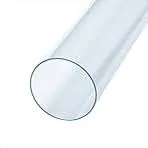नवम्बर . 09, 2024 23:14 Back to list
High-Density Polyethylene Sewer Drainage Solutions for Efficient Waste Management Systems
Understanding HDPE Sewer Pipes A Modern Solution for Wastewater Management
Sewer systems are vital to the infrastructure of urban and suburban environments, ensuring that wastewater is efficiently transported away from residential, commercial, and industrial areas. Among the various materials utilized in the construction of sewer pipes, High-Density Polyethylene (HDPE) has emerged as a leading option. This article delves into the characteristics, advantages, and applications of HDPE sewer pipes, underscoring their importance in modern wastewater management.
What is HDPE?
High-Density Polyethylene is a thermoplastic polymer known for its high strength-to-density ratio. It is produced from petroleum, and its structure consists of long chains of ethylene monomers, which attribute to its robust and flexible nature. HDPE is widely recognized for its durability, corrosion resistance, and low moisture absorption, making it an ideal material for sewer pipelines.
Advantages of HDPE Sewer Pipes
1. Durability and Longevity HDPE sewer pipes are highly resistant to corrosion and chemical attack. Unlike traditional materials such as concrete or metal, HDPE does not degrade over time when exposed to the elements or chemicals found in wastewater. This durability translates to a longer lifespan, often exceeding 50 years, reducing the need for frequent replacements.
2. Flexibility and Lightweight The flexibility of HDPE allows it to withstand ground movements, making it less prone to breakage compared to rigid materials. Its lightweight nature also makes installation easier and more efficient, as it requires less manpower and equipment to handle and place the pipes.
3. Cost-Effectiveness Although the initial cost of HDPE pipes may be comparable to that of other materials, their long lifespan and reduced maintenance requirements lead to lower overall costs in the long run. Additionally, the ease of installation reduces labor costs and project timelines.
4. Leak Prevention The fusion welding technique used to join HDPE pipes creates a seamless connection, significantly reducing the risk of leaks. This is particularly important for sewer systems, where leaks can lead to environmental contamination and costly repairs.
5. Hydraulic Efficiency HDPE pipes boast a smooth interior surface, which minimizes friction and enhances flow efficiency. This characteristic is critical for sewer systems, as it helps to prevent blockages and allows for the effective transportation of wastewater.
hdpe sewer pipe

6. Environmental Benefits HDPE is a recyclable material, contributing to sustainability efforts in construction and waste management. The reduced carbon footprint associated with the production and installation of HDPE pipes compared to traditional materials supports eco-friendly initiatives.
Applications of HDPE Sewer Pipes
HDPE sewer pipes are versatile and can be used in various applications, including
- Municipal Sewer Systems Many cities have adopted HDPE for new sewer projects or as a replacement for aging infrastructure. Its resilience and efficiency make it a popular choice for municipal sewer pipelines.
- Industrial Wastewater Industries that generate corrosive or hazardous wastewater benefit from HDPE’s chemical resistance. These pipes can effectively transport effluents without risk of deterioration.
- Stormwater Management HDPE pipes are also utilized in stormwater drainage systems, helping to manage surface runoff and prevent flooding in urban areas.
- Residential Drainage Home builders often select HDPE for drainage systems due to its ease of installation and long-term reliability.
Conclusion
High-Density Polyethylene sewer pipes represent a significant advancement in wastewater management technology. Their durability, flexibility, and cost-effectiveness make them ideal for a wide range of applications, from municipal infrastructure to industrial wastewater systems. As cities continue to grow and the demand for efficient and sustainable sewer systems increases, the role of HDPE will undoubtedly expand.
Embracing HDPE technology not only addresses the challenges faced by aging sewer systems but also aligns with environmental sustainability initiatives. As more stakeholders recognize the benefits of HDPE, it will likely become the standard choice for sewer infrastructure in the future. In essence, HDPE sewer pipes are not just a material choice; they are a strategic solution toward resilient and efficient wastewater management.
-
HDPE Natural Sheet: Durable, Food-Grade & Versatile Plastic Solutions
NewsAug.27,2025
-
Durable Glossy PVC Rigid Sheet | Premium High-Shine Panels
NewsAug.26,2025
-
Durable PP Rigid Sheet: Lightweight, Chemical Resistant Solutions
NewsAug.21,2025
-
PVC Grey Sheet for Extraction: Chemical Resistant & Durable
NewsAug.19,2025
-
Durable PVC Pipe Fittings for Plumbing & Irrigation Needs
NewsAug.18,2025
-
HDPE Steel Belt Reinforced Spiral Corrugated Pipe | High Strength
NewsAug.17,2025

